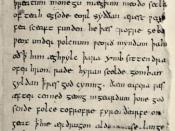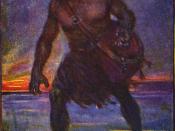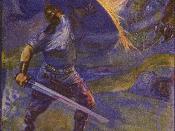In history, evil men have reigned supreme across many cultures. Some people say that being evil is inherent in every human. If this is true, then writing may be the ultimate way of releasing hatred of the world without hurting anyone. In Beowulf, all of society's evil men can be personified within the demons of Cain. The main demon presented in Beowulf is Grendel. Grendel personifies the exact opposite of what the Anglo-Saxons held dear. Beowulf, the story's hero, is the embodiment of what every Anglo-Saxon strove to become in their lifetime. Grendel is constantly angry, afraid and unsure of himself; while Beowulf is fearless and loyal to his king.
Through Grendel's own hatred and anger, he brings his own downfall. The "sin-stained demon" has his roots in the vile creature Cain. Since Grendel is spawned from Cain, he can never feel the love of God or of people: ".
. . God, / Whose love Grendel could not know." (84-85). It is because of this, that Grendel hates every mortal being he lays his eyes upon. Hatred leads to anger, constant anger, ". . . bearing God's hatred, / Grendel came, hoping to kill" (393-394). Fear is Grendel's other major flaw, "His mind was flooded with fear . . ." (435). Through his hatred and fear, Grendel seals his own fate.
Anger then yields itself to insecurity and low self-esteem. The moment Grendel realizes that there is someone just as strong as him, he tries to run away, ". . . Grendel's one thought was to run / From Beowulf, flee back to his marsh and hide there:" (437-438), but it is too late. Just like when the average bully meets his match, he runs in fear of not being able to win. Grendel does not...


